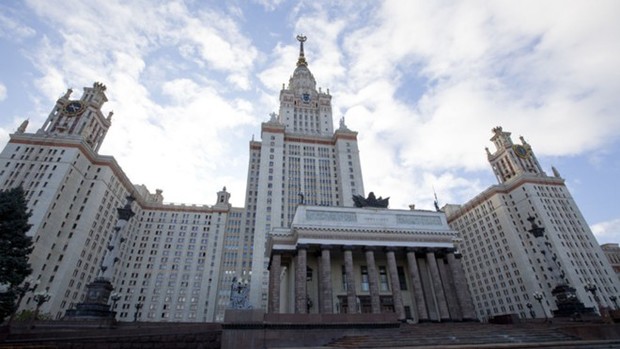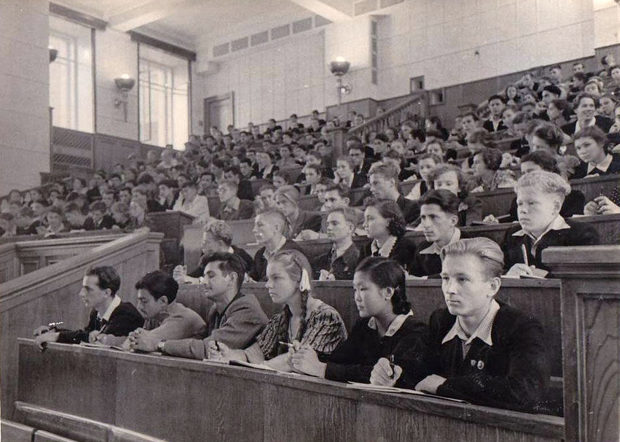Anna Novikova: ''Universities stop being a sacral place of storage and measured portion of knowledge''
Expert in media culture studies about elitist and mass education, ‘simple’ and ‘complicated’ people
The role of universities is changing again. When knowledge is in public domain and higher education becomes democratic, universities have to define their role. Some of them wait, others actively join the process of changing. In an interview to Realnoe Vremya, expert in media culture studies, Doctor of Culture Studies, Professor of the Department of Communications, Media and Design of the National Research University Higher School of Economics Anna Novikova tells what threatens higher education and discusses other topics.
''Soviet things are traditional for us''
Mrs Novikova, you have been working in the scientific and pedagogical environment of universities for more than 20 years. Could you tell how the situation and role of universities have changed over this time?
I felt it before I started to teach, when I studied at the Faculty of Journalism of the Moscow State University. I entered the university in 1989 and was the first generation of students who did not study according to the Soviet system. The Soviet educational system was collapsing in front of my eyes. Particularly the system of relations between students and teachers was changing. Me and the majority of my mates could not imagine that we could require university teachers to align the studying process with our desires. It did not come to our mind that it was possible to establish communication in another way besides vertical. If 'horizontal' communication was offered, it was done by the very teacher in the ways that were traditional for that time – like informal homely seminars with the discussion of debatable scientific questions. It is what is almost absent now. However, in many places, the hierarchical system of relations between professors and students was destroyed, the number of conflicts arose when a student did not like a teacher's attitude towards him, evaluation principle and system, set of subjects and discussed topics… Perhaps, the situation in classic specialities is easier – I am always told that relations with philologists are easier than with journalists. Philologists are psyched up for attention (that comes from the word 'understand'), they are ready to read more and understand more what they are offered. Our journalism students are more dynamic, have more initiative, often require aligning the educational process with their ideas. And I, as an academic director of the educational programme, also do manoeuvres. I need to listen to their wishes and maintain a balance of interests, to be above the situation a bit, so that the logic of education won't lost and education process won't divide into fragments eternally. But at the same time, teachers need to be flexible and aware of changes in the media industry when students often feel better than we do.
What about the change of the role of universities in society not from a perspective of domestic processes?
If we look at universities from outside, the big picture will also has two faces. On the one hand, we have some general European and Atlantic trends because of cultural digitalisation, development of the information community and knowledge society, democratisation of education, availability of information, etc. On the other hand, our country has a special political and educational culture. This is why even if we move in the general flow in some relations, at the same time, we try to oppose to something that is ours, defend our identity, our strategy. Much also turns on purely human reasons – the attitude to challenges of the modern time and traditionalism of a certain educational functionary and professor.

''I entered the university in 1989 and was the first generation of students who did not study according to the Soviet system. The Soviet educational system was collapsing in front of my eyes. Particularly the system of relations between students and teachers was changing.'' Photo: culture.ru
In other words, on the one hand, universities are influenced by the factors linked with the development of online education and availability of education, on the other hand, by frantic attempts to understand what to do with the traditional culture and traditional attitude to universities. Soviet things are traditional for us, any way you slice it. We have lived in such a symbiosis in the last years, and the situation is becoming more complicated.
''A Soviet person could not be too educated''
It is known that, initially, universities in Europe were created to give religious education, to understand people's spiritual nature. And even without this function, universities in Russia before the revolution and in the Soviet era were a place where a person not only got an education but a culture, understood his place in the world. What is changing today?
When we chose such a long historical chain, in its context everything looks less catastrophic than in a short period of time. Yes, the role of universities changed throughout history and is changing now. We can see we are at the tipping point now. And it is not the first time, and universities went through previous tipping points by changing as any living organism – with gains and losses. It is by far better than constantly being at one point because it is stagnation, marsh and dying.
Such shifts are linked with not only universities but also with changes in society, in general – appearance of cities, technological progress. For instance, a printed book appears, written culture starts to dominate over oral, such a phenomenon as mass intelligence appears – there are all very serious breaking moments in universities' life. We are at the analogous tipping point. And it is good. It is the time when information is available, when any person who is educated, give or take, can find scientific articles in some sphere if he wishes with the help of browsers. It turns out that universities stop being a sacral place of storage and measured portion of knowledge, it is pushed to it and it gradually refuses this role. 'Playing' the open publication of books and research results, open online courses, universities wash their sacral mission away. But it is not a death but a reason for their development. They invent again for themselves why they are needed. Now I don't see that universities are dying. Yes, they give part of their tasks, invent others for themselves. Some universities make up tasks more successfully, some – aren't. We will know what a strategy gave fruits and what was a dead end in several years. But in science, a negative result is also a result.
How did the fact that today higher education has stopped being elitist affect the situation of universities?
Massification of education did not start now but at least after the revolution. Then a big number of people, who had never been there, went to universities and other cultural institutes. And it is also linked with urbanisation processes when a great deal of carriers of peasant culture moved to cities. As a result, a class that did not get a complete education formed throughout the 20th century: that's to say, some superficial education was encouraged.
What is more, the educational process was always scotched by ideological issues because a Soviet person could not be too educated. It was to be a standardised education, without great choice. And, of course, from a perspective of elitist education, it is bad. On the other hand, it enabled a social ladder for thousands of people. It is very noticeable in the example of my family: my grandad was from the countryside, his dad and mum were illiterate, he and all his brothers got a higher education, part of them defended theses. But four brothers got a higher education having illiterate parents and occupied quite good positions in society. Somebody left the countryside, somebody moved to Moscow like my grandad. It was a perceptible social rise. Was my grandad smarter than his parents? Undoubtedly, he was better educated. But was he educated as elite? No, he wasn't. He was a person with a utilitarian education.

The Soviet system of education created quite a structured hierarchy of universities. There were universities oriented to industry and that prepared engineers who did not need to be very educated but be able to develop their sector as it was considered. And my grandad's case is so: he graduated from the Meteorological College first, then extension courses in an institute and became an agricultural meteorologist, dealt with weather forecasts to cultivate agricultural products. These are not the summits of scientific knowledge, it is an applied sphere. The Moscow State Universities, Leningrad Universities and a university in each capital of allied republics were real universities. Somebody wanted to become an applied specialist, get an education because of career. And somebody really wanted to deal with things that are distracted from pure pragmatics to a certain degree, and then he entered a university.
There was the third group of people who studied themselves…
Yes, there was quite a big number of people who were dissidents and did not enter universities because even elitist education presupposed imposition of restrictions to some Soviet structure. As far as it is known, Joseph Brodsky studied himself. All people say he did not get any education. But it is obvious he got an excellent education but he did it as he wanted, it was his responsibility. Was it elitist? Yes, but because of his power of search and choice. There were few of such people.
The system of free courses existing today presupposes that a big number of people needs to be able to make such a free choice, and the university system just simplifies their choice. Obviously, now self-education is real for a bigger number of people than when Brodsky lived because there are more possibilities. We don't know how far the people covering this road can go because one needs to know how to use possibilities.
What education can be considered elitist today?
As a phenomenon, elitism, in my opinion, is not linked with universities. Elitism is often an internal characteristic of human consciousness aimed to 'gaze into the abyss'. And there are people who are inclined to philosophy in its widest sense, who can't live otherwise, who complicate everything, from a point of view of other people. And there are people who are not inclined to complicate everything but, on the contrary, they are inclined to simplify everything and won't philosophise. And if they are in the environment where it is accepted, they will feel uncomfortable like it will be uncomfortable for those who think in a complicated way in the place where it is not accepted. There are people who see the world in a more complicated way, notice more nuances than others. Elitist universities' task is to gather people who think in a complicated way, enable them to develop and enrich each other. Education is another task that universities don't refuse. In my opinion, opening doors to the 'complicated world' is also universities' task, a tradition that comes from the Age of Enlightenment and earlier – from the ancient culture. In general, universities don't refuse it. But it can't be universities' main goal in modern conditions. For instance, the media can accomplish it better.
Part one. To be continued.